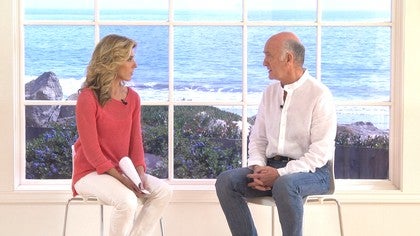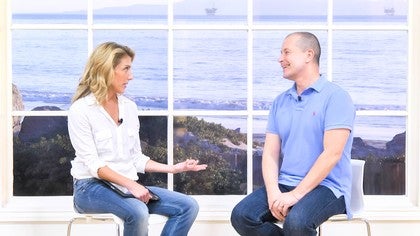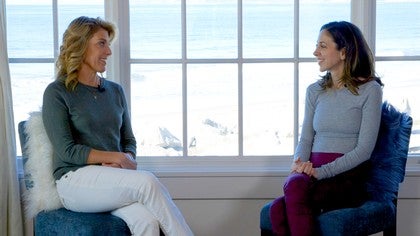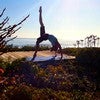Read Full Transcript
Welcome to another extended discussion here on [inaudible]. Anytime. If you don't know of Alan Herdman firsthand, you may have heard his name from some of the many people he's taught. Julian Littleford realize Sokowitz Ni Ajer, Gabriel Michael King, Kathleen Murakami, just to name a few. Allen studied at the London School of contemporary dance and was working as a teacher and as a dancer when he was invited to go to New York City to learn Joseph Pele's method. He did that. He worked with Bob Fitzgerald. He worked with Corolla trickier and he went back to the UK in 1970 and opened the first Pilati studio in Britain. Uh, he's been teaching and influencing instructors and clients ever since.
And it is a privilege and honor to welcome Alan heard him into the studio today. Thank you for coming. Thank you. There's a lot I want to get to. I always do. I'm always a little nervous in the beginning, so bear with me on that. Um, you're a big part of the lineage I come from, I believe. So. I want to just start at the beginning and find out how you got involved with [inaudible]. So please take us back to the beginning of your [inaudible] experience.
You were teaching and dancing at the London School of contemporary dance and, and um, let me start with what inspired you to become a dancer? I W I was studying at the school, um, of contemporary dance. I W I'm a farmer son from the north of England. I've got four brothers and in the 50s, farmer sons did not want to dance or did want to dance, but weren't supposed to. And I, I, from about the age of 14, 15, I wanted to be involved with the stage. And dance was my first love.
And to, to do that with the, my background was almost impossible. So I had to wait until I was 21 before I could do it, because in those days, that was the age of consent. So as soon as I was 21, I stopped doing what my parents wanted me to do and did what I wanted to do. So, um, I went to college and joined. I went to college into the geography department to be a teacher. And when I got to the college they'd open a dance drama department, which I moved over very quickly. This was in the north of England, this was in the thumb Boland.
And the second year we went to London on a, in a field study cause Martha Graham was performing. So we went down for a week in London and I absolutely flipped when I saw the grand company. And I hope this is what I want because what I had trained, my training in college was with Lobban, which was all sort of expressive type of dance. But I needed something a little more physical. So my, my plan was to go to London to be a teacher in school for what I was trained in, but stopped studying at the London School of contemporary dance. How does that happen? I mean, do you do audition? Do you, how does no, you didn't have to audition for the school. I went as a part time student. Okay.
And it was in its very early stages of the school. Okay. Um, so I went and I studied part time for three years with them and about what years are we talking now? We're talking, uh, 66 to 69. Okay. And after three years, you know, I w I'd want it to be done spin for years. And after three years of trading I thought, do you know I love this technique, but do I want to perform? Oh, I really felt that. I mean, to be honest, I mean my ego was front row of the chorus. My talent was back row.
So I thought maybe we should think of doing something else but involved. Yeah. So I had decided to go start, move over to theater so I could merge the two things. And the school suddenly asked me to go into the office and said, we would like you to go to New York to train in this exercise technique. So I said, well, what sort of exercise technique is it and why me? Yeah. So they said, well, it's very good for dancers and we feel it's good for the school and why you, you are experienced as a teacher, you've had dance experience.
And you're older than the rest of the students. So that worked. So I packed my job in much to the dismay of my family and went to New York to and met Bob the child. Where are you excited to go? Where are you, I mean, you've now kind of entrenched yourself in as a teacher and what did you expect going to near you? Did you know anything about the, that's not a thing. I didn't know what to expect and the, my friends and family said, what if it doesn't work out? And I said, if it doesn't work out, I come home because I've never been, if only this, if only I'd done that. If only I'd done this.
I'm always wanting to do something different and I'm quite happy if it doesn't work to retract. So the school asked you to go, they obviously know where they're sending you to Bob Fitzgerald. And is the plan at that point to come back? Oh yes. That, that was right from the start. We, we send you, we fund you, but you come back to, to open the studio here in the studio? In the school. Okay. So you show up in New York City. Had you been before? Never. Okay. Um, can you tell me what your first experience with Polaris was like? Frustrating in a way. Cause it was, you know, I went into this studio, which was on 56th street [inaudible] on the, on the first floor. Um, and I saw all these people on this, these pieces of apparatus doing all these things and lots of different movements, lots of different types of people. And I thought, oh, will I ever get together with this? So I was like an apprentice.
I spent all day in the studio. In fact, I lived in the studio, there was a little, there was a little room off the studio, so I lived in that room and had to get to the bathroom and back before the first client came in in the morning, cause it was an apartment converted. So I spent my entire day in that studio from morning til night and just soaked it all up and, and, and I think that was great because I got the feeling of, of what it's like all the time. Um, I'm just trying to imagine myself or, or the situation where you're doing one thing and while I, I not as a dancer, I think it's a similar, there's similarities. Um, but, but here you are in a new country, a new city, um, a new discipline immersed in it completely. Um, initially frustrated. When did it transition or can, how did it transition to something that, you know, you obviously you're 42 years later, you're still teaching it. So I'm kind of wondering how did it become something that was enough to keep you continuing to do it? I think it w it was what, it was the same as what attracted me to the Martha Graham System at the beginning. It was this physicality of it, you know, it was um, taking, uh, taking a body of difference shape, different size and getting them to do things. And I love, I love people, which so important, very important.
So it was working with different people on, you may have the same exercise with a certain very different person. And I just suddenly realized that, that, you know, this is something that I really enjoy doing. And also seeing the change. I think that that's the other thing. What kind of changes did you see change in posture? Um, change in, uh, change in shape and also changing what, what is so fantastic if you've got someone who they may think they're not very good. Oh, I can't do that. Yeah. And then they can do it. And the, the joy, it's amazing. You talk about joy a lot and I shouldn't say talk about weight.
This is really only our second conversation together, but um, I hear that about you then. How much of joy plays into all the time, your whole life. Palabra is all the ho I, I, I didn't do anything that I don't like that I don't enjoy. Hmm. But that's a, that's not right. I have to do the computer and the counts, but I mean, but, but you know, the are the main parts, right? Yeah. That's great. And you find that [inaudible] that will stay still and it still does. Yup. That's true. Okay. So, um, you're in New York, Bob Fitzgerald. I don't feel, and, or maybe I'm speaking for myself, I don't know very much about Robert Fitzgerald. Can you tell us just sort of the basics or whatever you feel we need to know?
He was, he came from the Midwest. He, he trained as a dancer. Um, and he, I think he danced in the Midwest and also New York. I think he did some work with Martha Graham. I'm not sure about that. But he trained with it. I don't, I have, I have a feeling that he went to corona because he had an injury as a dancer. So he learned the heat. He was taught by Corolla.
Was He ever taught by Joseph [inaudible]? He went to Joe for a period after working with Corolla. And I don't know how long that was that he did spend some time with Joe. Um, he did not get on with Corolla. Oh, there was this, I don't know why it was, but there was this animosity between them. How did, without too much detail, how did that show itself to you having just shown up? Oh well, um, he, he just said one day he said, I can't stand Corolla. Tree. Yeah.
You just said so. Okay. So unique cause I haven't met her. I couldn't really comment. I went oh, okay. Okay. Okay. So he, he was a dancer. He trained a little bit with each and now he has a polarity studio or was it a dance studio? [inaudible] studio. Okay. Okay. Yeah. Um, how long were you there? I was there for, but a nine, nine and 10 months. 10, 12 hours a day living there. Yeah.
And then you went back to [inaudible]? I went back to England. Yeah. And this is now, I'm assuming, is this 1970 when you open this is 97, 1917. And when you went back, did you hit a, you opened the studio, tell us about opening the studio. Was it your individual studio? No, it was owned by the school. Okay. Uh, we, uh, we had, uh, someone do the drawings of the, the apparatus that, um, Robert had, which were the same type of Corollas. And we sent the drawings to the school. And the, the, the workshop, the, um, the, the scenery shop of the dance company made the machines.
Oh, really? Thought they were made on site. Do you, are there, are they still around? I don't think so. I've still got the drawings, but the, the um, the machines aren't around. What were you doing with those jobs? We don't know yet. I have some ideas for you. I know. Um, okay, so that's interesting that because there were no manufacturers or were there? I don't think so.
I think they got people to meet and of course Joe made his own stuff. Sure. Yeah. Um, I don't think there were many. I mean, you, you'd go to Joe blogs down the road and said, can you make this for me? Yeah. Oh, okay. So now you've opened the studio in the school. Who Comes? I assume the dancers. The dancers. Yeah.
And I taught mat work classes to the students and the company would come. And then gradually the, uh, the people who worked in the office came and then we open it out and the public started coming. Hmm. And it was, you know, it was a slow process. I was in this little room at the top of the building with a one reformer and one trap table and a chair. So we started there. I can remember it was white dead white fabric on the, on the dead, white dead white, like, I mean gloving [inaudible] very quickly. [inaudible] it's not. Ivory had a wonderful story.
We had a, there was an actress who still alive who was a comedy actress who was very dramatic and well masters of makeup. Oh, that's not good on mine. And her eyelashes were out to here and when she left the class you'd go around picking the eyelashes off the machines. So then after that I said, no more white. Yeah. Well I understand. Okay. Um, how is it, I've heard you worked with Corolla then, where, where does she fit into your site? I went back too. I went back to New York a couple of times to to get, you know, some more experience with Bob Fitzgerald. And that's when I just found out where corona was and I would work with him in the morning and spend the afternoon with Corella or vice versa.
I have to just share that. Can you share that? You didn't tell them? No, I didn't. None. Of course not. Okay. No, no. Because what would have happened if you shared this with Bob Corona might've thrown me out and I think Bob, she, she was clear to that, but also it wasn't. Okay. So what was the difference with tiering? I want to ask about Corolla in a moment, but can you tell me just what was the difference between the morning with Bob Fitzgerald in the afternoon with [inaudible]? With Barb, it was very laid back. Um, this scenario in the studio with Bob, he had two Salukis, which were lying around the students, two Saluki dogs. Oh, I dunno, that is that Egyptian hunting dogs, but quite big.
And he used to smoke brown cigarettes in the studio when he was teaching. Is that like a clove cigarette? Yeah. And so it was all very casual. You know, there wasn't a lot of, you know, people would come in and stay for quite awhile and some would stay for, you've got to Corolla and it was pristine. Everyone says that. Absolutely pristine. And she, um, you couldn't climb the springs. What would role, oh, you'd be shouted at. Absolutely. You know, there was no noise. That wonderful story. We, there was three of us in the studio two and there was three, I think she had three reformers and she came out of her little room, she'd been resting and she started shouting at a, at a, at what we were doing, or we thought of what we were doing. So we had God, are we in the right place?
Are the springs right? So we looked at each other and we, well, seems to be all right. And her problem was there was an empty reform of between where we were working. I had to, Shit, she would not, she objected to walk walking between an empty or formal, so we had to shuffle up yeah. As a teacher. Wow. Wow. But I mean, she was great, but with corona you accepted this is what she was like. And as far as I was concerned, she could shout as much as she liked me, but I was learning from her because I firmly believe you don't have to like a teacher to learn from them. I agree. And not that that is important. Absolutely.
What did you, what is the, the most lasting thing you learned from Corolla? Precision. Precision. [inaudible] with the work with, with the work, with precision, with the work to be, to take everything in into consideration. Okay. So you've now come and gone a couple of times to work with them and you go back and open your studio. Um, one question that comes up from me is how, how different was [inaudible] or, or is it different? Um, when you first opened the studio, you have several, a couple studios that I have. I have two students in studios now. How different is PyLadies today than it was then for me or for in general? For you? For me. Um, uh, I felt that in those days I didn't know enough.
Um, I just felt that I needed much more experience and this is what I tell my students now. I see, you know, you're so lucky. There are so many conferences and workshops that you, so many studios you can go and observe and get experience from everyone else. I didn't have that. So I found, I found my training with no disrespect to Bob or to, uh, to Robert or to corona. I found my training was lacking and I needed to flush it out a bit. So this is why I did Alexander.
I did touchy and, and I consulted with physios and osteopaths. If I had a problem, I would talk to them about it and it would fill me in on much more, in much more depth of how the exercise should be done or how should it shouldn't be done. So you went to Alexandra and those techniques after as a means for supplementing what you had already learned through dance and through a lot of stuff. A wonderful, wonderful. How do you feel that that informs your [inaudible] as a whole? Like with, with, um, with Tai-chi it gave me a sense of balance and breath and calmness.
I think I've learned from that. And with Alexander Technique, it, it helped me with this feeling of elongation and posture and it made me realize that if you've got someone who has the correct posture, a lot of the muscles will take care of themselves. Right? That's a hard lesson. I think when you, when you've learned, you must inhale here, exhale, no, your arm goes here, aren't there? Here's the point of the exercise. Nevermind what else happens. So I think that's a hard lesson and I, I'm, I'm just highlighting it for people to hear hope. Wait, wait. I think, you know, there are different styles and I think this is fine. You know, there's not a problem with different styles, but, you know, I, I, I just find if you say you breathe in now, you breathe out.
Now that doesn't work. I mean, depending on the person, how they're breathing and sometimes, okay, breathe in this time tomorrow, let's try breathing out that time to, to find out which breath suits your form of movement. So you're fine with mixing all of Oh, absolutely. Yes. So you s you said, and I've also heard that Martha Graham's that performance that you saw was, um, it seems integral to your, to where you are now. I'm wondering if you ever met Martha Graham. Well, when I first went, when I first saw the Graham Company, I didn't meet her because they were just there on tour. But when I was involved, when I'd started doing pinatas in the school, uh, Bill Luther was a very good friend of mine and she was over with her company and he took me to meet her after a performance and she was great.
She wants to know about, cause she had done Pelotas at some point she had and she was interested, uh, and chatted away for awhile. But what I've found great was that a couple of years later she was back in London and bill and me went to see her again and she said, Oh yes, you are the young man who does Pilatos after two years. And I thought, my God, that's amazing. Wow. Yup. And now I'm curious, did you know there's always that question of did, did she ever know Joe did, did, did they influence each other? I th th the story goes that she wasn't very keen on Jo. Really? Yeah. Okay. That's the story. I mean, whether it's true or not, but, um, so I think she must have had some connection with in to d to, to say that, you know, you need to know someone to say you don't like them.
Right. Yeah. Especially publicly when you're hurt. Exactly. Oh Wow. And what did anything strike you about her? I've, I, I'm not a dancer, but she's, you know, every quote I read from her, I just makes me think she's bigger than life. She must be [inaudible] she was bigger than life. And she, I mean, she is, she, I think her life was a performance, which I quite loved at the time, actually. How so? I think I know what you mean, but how do you mean that her life was about? Well, I mean, even when she was off stage, uh, is she, was she, she commanded an audience, whether it was a peg sitting in seats or standing around her, she just, I think, I think she, she'd worked for that and she deserved it as far as I was concerned. And that was about what years was that, that you met her?
This would be sort of mid seventies. Okay. So Joseph was now gone. Yeah. Um, something else I've always wanted to know is you've trained some of my favorite people, Julian Rail, Michael King, um, Neidra, uh, Kathleen Mircom me, two of my teachers have studied under you, uh, Kathleen and rail, but I, I think Michael King and Julian worked together on the floor in your studio. Right. I would just love to know what that was started because after about, I think it was around 78, I decided that I loved working in the school, but I thought it was time that I started establishing myself. So you're already in eight years. Yeah.
So I needed to move out from the school. So I found a big church hall, uh, to set up my first studio and it needed to be painted. So I used students from the school to paint it. And Julian and Michael [inaudible], they painted your studio by the studio and then they didn't tell me that part. Um, I started training in there. They worked, um, on the floor.
And then of course Julian, uh, went off to, um, he came to America to dance because he was talented. Um, Michael, um, stayed and trained and was teaching for me. And um, I don't know. I'm just wanting to know what were they like, are they eager? Were obviously they were, you know, with, with were they were fine. I mean, where they're friends with age, I don't think they were friends that much, but, but Julian was Julian's Julian. Even then the women who worshiped him his whole life. I mean the clients is too faint when he was at there. Cause you know, the way I know, and, and I used to say Julian, no, no, no. So how long did either of both of them work for you?
Uh, um, Julian on and off because he was trading. And then of course we went to America and Michael worked with me for quite a while and then I sent him to, I'd opened a studio with Houston ballet and, um, after while we needed someone to fill in, then we didn't go. We hadn't anyone to send for, we didn't have anyone from the states, so I asked him if he'd be interested in going to Houston. Um, and he absolutely Rhonda. Yeah. And that's why we suddenly, you know, that's, that, that that was the end of the Michael and me working, cause then he, he worked for the Houston Valley and then he moved on to I think Reebok and then started his own thing. Yeah. Yeah. Okay. Are you in touch with, I know you're in touch with Julian cause that's how I, he as usual came through and [inaudible] I'm in bed all the time. Yes. With Michael. Not really.
If I see him fine. Yeah. Okay. Um, then there's my other teacher, another teacher of mine, Kathleen Morikami. Um, and, um, I, she knows the whole story about it. Well, her story is, I do have questions. I said, what, was there anything that you think I should ask Alan when he comes? And first of all, the first story is can I come to, it's my birthday weekend, so she'll be here tomorrow, but, um, she said, and I'm gonna read it so I get it right. And the days I trained with him and she puts trained in quotes. How and why was it that he's so generously offered to teach me and others?
I believe she mentioned Donna place as an apprentice of basically no charge. Was it generosity of spirit for fun or what? She came over with a friend, which was Donna was that, I'm not sure if that was Donna, but I do know she had mentioned this story in her bio and um, they came over and they wanted to study and they didn't have any money and I liked them. Why not just like that. Yeah. You, no, it's, it's, it's, I wasn't running an official training school then, so I wasn't doing a regular training. And you know, it w why not?
Elizabeth Jones did the same. June Elizabeth Jones had a studio in, um, in Houston, Texas, and I think she was trained in New York, but she now lives in north North America. But she was the same. I mean it's, it was, no, we have a saying in English. It was no skin off my, it was really, yeah, but, but it's time. I mean, were you hoping they would work there? I know, no, no, I knew that come back [inaudible] come back to the states. No, it's, even now if I, if I've got someone who comes to train and I think that talented and worthwhile, I will make adjustments. Yeah. It's, you know, it's, it's how it should be, I think. Yeah. Really. Hmm. So that brings me to, I'll charge her what I see. It interests interest. It's been, what, 30, 20 years? Um, well, she, she's wonderful teacher. Yeah, I know. Yeah. And she refers to all the time, you know, I'm, that's why I, you know, I start these interviews and some are more nerve wracking than others.
And this is particularly so, because I know Rael attributes a lot of his learning through you and, uh, Kathy Murakami. Well, and you know, therefore when I see your books or when I see, um, you at conferences, I, I see myself to small degree and it's very exciting to, to reach back and to, you know, whether you like it or not, it's a little different story. But from me, I can go that's, that's Cathy, that's real. That's me and I, I think that's so important this early in our well in the lineage, you know, if we're going to be 5,000 years old like Yoga, which I believe we are, I think it's really cool to know where it started and where we are in, in that. So, um, that brings up a couple of things from me. One is certifications or training programs. We now call them. Um, I suppose the question is what do you think? I think a w in, I mean, in various countries now you have to be certified by the government because then they're putting in, it's happening in England as well. Um, is that good or bad? It's good in a way, but, um, it means that sometimes talented people don't get to do it. Well, it's, it's, you know, there's certain criteria, um, that you have to, to choose to look at to take someone on shore training course at a, is that like a school, a degree in kinesiology or, I do agree or teaching something about something else and I think that can, um, restrict, restrict the free spirit of teaching. And you know, sometimes we don't, I travel around a lot. I mean, I travel the world teaching and things and I look at some of the teachers and they are good that this absolutely nothing wrong, but there's something missing that they don't, it's almost regimented.
[inaudible] you mean the existing teachers that are teaching in the conferences and stuff that you're at or just teach him? Teach us? No, no, no. I'm not specifically saying, but I just, and it's not all the time, but I see these people and even in training schools, I think, God, that there's no individuality in it, which I, I, um, that I want to see. What does that look like to you? What does individuality, meaning that someone will go into a studio, I'll go with the people and go, this exercise doesn't work. Let's do it this way. Let's change this. This person is different. I want to do something different. You know, it's, it's uh, bringing their personality into the, um, into the trading, into their teaching. When, when I'm running my training school, if they don't teach in practice and I say, you're training with me and you're teaching someone in my studio, one of my clients and you do something that I haven't taught you. Yeah, but you've just done it because that's suddenly you feel you have to do this. Yeah. For me. That's fantastic. That is none of it. I didn't teach you that.
That's not what you've been taught. Right. This is me going, you are using your knowledge and your ex, your feeling to teach that person and that's fantastic. So with your training, your, you're there most of the time, right? You don't have franchises? No, no. I do all our training and I'm with the students about seven hours a week, but I have a kind of assistance when I'm traveling. They will take over, but I'm never way more than two weeks from them.
Sure. So you, you, I'm, part of me thinks you have the luxury really of, well, I guess it's not a luxury that you're there all the time, but you also, you can tell when they're gleaning from the knowledge you've given them versus creating something on their own. Right. The first time you meet them. I D I w I mean people talk to me about franchising and you know, like us sea life and it's becomes a big business and um, I'm not that interested in it at this point. Maybe I'd rather do small training courses because I'm not interested. I don't do training as an income. My studio runs themselves. This training is an extra, so it's not a training studio. It's a, a Palacci student with training facilities, which I think is important.
Okay. You are known for, I don't know what the word is, but I, the, what's coming to mind is you're, you're the guy to go to for preparatory exercises. People are days, um, and it's, for me, it's unique. You know, that's what I identify with Kathy and a little bit with Robert Moore, Kathy, that she brought directly of yours and would say so and so part of me thinks, don't you want more people to have that then can come to the UK and be with you that [inaudible] well, I mean like I do this at work, at conferences and stuff. Um, I mean it would be fine, but you know, there is life after [inaudible] and it is, and I, I'm, and I love doing it and I still love doing it, but it's, I don't want it to take over my life. And if I did franchising, I'd have to have staff, I'd have to have this and it, and it's, yeah, it's not where I'm at now. Maybe 20 years ago I would've done it, but, but not now. Since you said that I want, I just want to share a story with you. That was when I first met you and I know you don't remember it, but, uh, I was in South Africa and, um, we were at, uh, uh, Bri, Bri, um, at theos. And I remember wanting to ask you a lot. Rail was even there and just kind of wanting to watch the dynamics and, and, and we were all kind of slowly but surely getting more and more comfortable with asking you questions and you were having a good time or trying to, I think I was having a good, OK, good. And so, but, but you said look after some version of what you just said after all there is life after polarities or it's just exercise at the end of the day.
And I remember instantly feeling like it both, um, appalled and exhilarated. It was, it was, it was the first glimpse of somebody, okay. Acknowledging what I felt inside, which is, it's important. This is my story around it. It's important, but really the minute you overdo it, it becomes something else. And you said it and I was like, oh, I don't know what to do with that. But it, it, it set me off on a different way of thinking, I promise you it became, how do I want to be with this? Do I need to be the teacher trainer? You know, do I need, do I need to affect change? Yes. But do I need to associate anything else with it? No. And I went to my high school reunion right after that, about a year later.
And I remember thinking they're going to ask me what I do and I love what I do, but I felt like, do I need to say this or that or, and I didn't. And I just, I was so like teachable audience and I remember them going, oh good. Cause they didn't have any sense of what I felt about it. But if I would've made it anything more than that, it wasn't true for me either. I, I just, I meet a lot of people that consider politeness to be almost a religion. Well, yeah. And it's not, it's not, it's great. It's bay worthwhile that doesn't say it is exercise. Yeah.
Yeah. Okay. So if I could take that further, what, you know, for 42 years of teaching exercise, what keeps you motivated? Uh, [inaudible] that brings up another question. Yeah. I, I'll, I'll answer that. What keeps me motivated. Motivated. Is it other people have cell though? You could cause shopping, you know?
Oh yeah. That's not bad to the people who come to me and I forgot people coming for 35 years. Really? Yeah. I have grandmothers and their grandchildren coming into the studio. So I've got got three or four generations. But it's, it's the, the reaction you get the, I don't know, I tell the story there, there was one Chisholm morning when I was teaching and there was a, a, a woman on the reformer and she was, you know, she was doing her work and really very well and complementing, uh, teaching her and she got up and stood up straight and she said, not bad for 90, 90. And she'd done short spinals she'd done this and she found that I, you see that if it wasn't for Politesse, if it wasn't for the exercise, she wouldn't be able to do that. Right. So I mean, this is what, uh, this is what keeps me going, cause I can, and that's to, to someone to come in and you look at them and you know, you can help them. It may not look amazing when you finished, but it's helped them.
And W I think the trouble is sometimes everyone wants to look the same. They want to have this and they won't have that. But what I want to look at a 56 year old woman who's never exercised can suddenly bend down and put a shoe, all those on thing. Or I'll go upstairs without having pain. That for me is what it's about. So there is something in the translation of what the exercise does? Yes. Okay.
Yeah. Okay. Right. Cause I don't, you're not the guy who counts for people or you know, I mean, I think of exercises, um, I don't think of [inaudible] as exercise either or I do think of it as exercise, but not just exercise. No, I mean, but I mean if you go down to it, it is exercise, but it's the way you do it as the, yeah. It's the way you approach it. Yeah. Because I, I hate to say this, but some of the teaching I see it, you might as well go to the gym. How do you mean that in that it, there's no concern about the individual. It's, it's about the technique. Okay, this is the technique and this is the way you do it. [inaudible] you how did we do the hundreds fast we do, then we did this, then we do that. And for me that's not, you know, that's not the way it should be. How should it be?
It should be working for the person. So if for example, if you've got a woman or man that's not very strong and not pay, coordinate doing the hundreds as disastrous [inaudible] so don't do it, maybe introduce it later, but it doesn't have to be the first exercise. That reminds me, Kathy also said, ask him what he in all caps really thinks about the arm pumping in the hundreds waste of time. Really? Yeah, but isn't [inaudible] what's the 104 I asked people and they say, well, it's poor the breathing. And I said, okay, would you stand up and curb your appetite also forward and pump your arms and breathe? I said, well, I can't. I said, well, aren't my questions answered? And the pumping of the arms is for energy. They tell me to do the energy.
Think there are different ways of doing it when you're just moving from your shoulders, which in fact most people pump with this going up here. Yeah. Okay, so how do you do that? A hundred I don't do. You don't do the a hundred very rarely pause. Very rarely do I do the a hundred some of my elder clients who've been doing it for guys. We'll do that. Okay. Okay. Hold on. I'm not disrespecting. I'm just like, I'm, I'm a teacher. I'm going to go to the UK and I'm going to learn polities from Alan Herdman. Oh, I'll teach my students how to do the hug blood. It's in my training pro.
Okay. Oh yeah, no, I'm okay. I would teach them, but is it because this is what you know, I, I will teach them exercises that I don't agree with because they are the ex, except they are the exercises and I didn't want them to go out and for jobs and not have learned them. Now this is my personal, okay, thank you. No, it's not that. It's, I don't dismiss it. Okay. Very good. So you don't see a need to give it to the people you're working with. I see. Okay. Thank you. So I want to bring it back around again too. We started to mention that certain countries have national programs for certification that people have to require.
And you said that that prohibits some people from even entering the training that you feel maybe would blossom despite their lack of background that suits it. Um, what do you think about, uh, I don't, you know, I think you have your finger on the pulse in the u s as well because of how much travel you do. Um, just in general, what do you think of, um, standardization of certification or training programs? It, you know, not that they're all exactly the same, but yeah, I think the, I think standardization would be a good thing as a, as a base, so that you, uh, which I think is probably asking the impossible, but I think it would be a good thing that you, you had the base which to build on. And when I say standardization, I don't mean everybody doing the same thing, but of standardization at the amount of hours of training about the, um, the time the training spent that, that it has to involve studio time. It has to involve working with people rather than just, you know, you can do it on the Internet if you, if you, which I think is varied, very dangerous actually. I agree. And yet, you know, we offer workshops and so on and it's when people are gleaning from that as if you can put pieces together. It's, I find the very scary in our position on blogs, anytime, but education is one thing. But the initial training program to build your foundation has gotta be in the studio with Oh, absolutely. Absolutely. Yeah. I'm just, and also, uh, a knowing that you got, you have the experience of working with people that you don't, uh, you don't come in and just have this paper in front of you with the list of exercises.
Right. Right. And no mentor. Absolutely. Yeah. Um, after 42 years of teaching, what do you think is the most important skill as a teacher? I think one of the most important skills is recognizing the difference of body types and personalities that, that you, um, you adjust. And I have this mantra that I'm sure you've heard, um, client first technique second that you recognize that, that the, the, some exercises are not suitable for the person and some people are not suitable for certain exercises. And W which I think is, um, important to, to be able to see because you, I mean you can waste your time. I mean time is at the essence in a studio. You can waste your time teaching something that is no good for that person.
So I see you've got to make that time meaningful. You know, they may pay so many dollars for an hour, don't waste it on things that are really going to help them just because it's the technique. And also, um, recognize and I think this, this is probably just me. I recognize people's personalities, the people's vibe. You know, I hate this term, but it works with me. You know, cause I'm like, I can work with someone on a Monday. So I work with someone on a Monday evening, say, and they were doing class and then on the Thursday they come in, say for their second time, I will recognize that there are, they're different, they're different from Monday. So there's certain things that are, there's certain areas that are keep away from. Right. And I think that's important. So for example, if they come in frantic, you're not, you either are going to give them something that calms them down or just a pro. Or they'll say, well, why didn't we start like we did on Monday?
So we'll just have a change. Jeff, for example, if you're a, uh, like my studio in Canary Wharf, it's the big financial district. If you're a dealer Monday, you're beginning of the week, Thursday you've had four days. Yeah. Big Difference. Interesting. And on you account, you're taking that into account. Absolutely. Yeah. That's great. Do you still work out? Oh yeah. Hmm. Do you have a teacher that you go to? No, I w I work out on my own. I do a lot of demonstrating. Um, I go to the gym and I walk a lot. So, um, and this last weekend I did a weekend with Debra Debra lesson and I'm still sore from when Deborah was here two months ago. I was sore for a couple of days, but not as bad as I expect.
I was doing all these exercises I hadn't done for years and I looked around at these young things, complaining and things. I said, come on. I loved it. I loved it. It's great. So do you, do you don't have any issue with being Elon Herdman in someone else's class? No. No. Good. No. Treat me the same. [inaudible] incorrectly. Yeah.
Yeah. That's great. Um, okay. What are you doing in your spare time? Um, I go to the theater. Uh, I like the opera. I like, I dance, I go to the theater. Um, I read and I just, I mean, I don't have a lot of spare time because I'm involved with the studio, but you know, I just like people. What was the last book you read? Last book? Well, the book I'm reading as a fantastic one, which I can't tell you the name cause I've just started and it's about India, about a guy traveling. Is it Shantaram? That's it. Yes. My favorite book. I can't put it down. It's my favorite. Yeah, that's the one. Chandra. Okay. A friend gave it to me. She, cause she says read it twice. And I looked at, she said this is for your travels. I said what? But no, it's great.
So what do you, you're again known for [inaudible] assisting people. Some, sometimes people call it pre Pilati. Sometimes people call it not lattes. What do you say to the people that say Alan Herdman, this isn't a direct quote, but that you're not teaching the ladies you're teaching pre Paul Audis. I said, yeah, you're right. Absolutely. Because then if you stick around, they'll get to pull out is, Huh? You know, it's not just, I'm just teaching this way. I, it's a preparation that I think a lot of people should do. Yeah.
Whether it's my way or someone else's way. Too many teachers go straight into the technique, which is not easy for a lot of people. Right? Right. And so, you know, I, I've got, I, I'm known for, and people say it's not [inaudible]. No, I know it's not, but it's a preparation, right? If you really look at the, the preparatory work, and then look at the person that's doing the, the, the real exercises, you'll see a difference. Right? So you don't consider it as like a departure or, I just think [inaudible] well, I, what I did a few years ago as I have my training course had quite a few dances in it. So I thought, right, I'm going to do an experiment.
So immediately we went into the technique, the 34 exercises, it was disaster. They looked terrible, and they were trained as dancers. Yeah. So we, we did that for about a week and I said, right, we're going to put this to one side and we're going to go to my [inaudible] thing, which we did for about six weeks. Then when back to the main technique and the difference was amazing. Wow. Because they w my, one of my things that I really am very strong about is recruiting to the correct muscles. Now you see a lot of people who are doing the very difficult exercises, but they're not recruiting. And I found this with Deborah in last weekend.
A lot of those kids who were teachers, they're all teachers were unable to recruit the right muscles to hold positions. And it didn't tell them no. Wasn't being a diplomat. I am very often, I think you are, um, what is Peloton to you? My life. Really. Yeah, absolutely. And yet it's just exercise. Yeah. It's just exercise. Yeah.
Hmm. If the people at the London school didn't send it in New York and you didn't teach philosophies, what do you think you would be doing? I think I would been in education of some sort. It would have been in the arts teaching some way, whether it be movement or theater. Um, that's what my aim was going towards when I was diverted to New York. Hmm.
But I guess I would have been retired. You're not going to retire soon. Absolutely not. No, no, no. Thank you for being here. My pleasure. Thank you. That's actually really great to get to know you and thanks for all the influence you've had on so many of us. Thank you.





























